Overview
LAU Fundraising Efforts
Faced with the gravest crisis in LAU’s existence due to the economic and financial collapse in the country, we redoubled our efforts to shore up our institution, our faculty and our students’ right to an education. In addition to our fundraising campaigns, we formulated a Survival Plan, while ensuring fairness to our faculty, staff and students in a way that is sustainable.
The plan entailed a fee adjustment in the Lebanese pound along with an increase in financial aid to approximately $80 million; an unprecedented use of returns on the endowment; a halt on all postponable projects by way of capex management; a dynamic strategy to retain our faculty; and a drive to achieve a competitive advantage in online delivery.
In support of the LAU Emergency Financial Aid Fund, the Development Office, the Alumni Relations Office - both in Lebanon and LAU New York Headquarters Academic Center - and the Strategic Communications Department pooled their resources to organize an online art auction, a first for the university.
LAU ArtsRising, a 12-day event from February 18 to March 1, 2021, in collaboration with ArtScoops featured a wide range of multimedia art generously donated by notable LAU alumni and faculty artists as well as friends of the university.
It comprised artwork by renowned Lebanese painter and former Associate Professor of Fine Arts at LAU Chaouki Chamoun, Department of Art & Design Chair Hanibal Srouji, alumna Mona Hatoum (‘72), alumna Rana Raouda (‘83) and our distinguished partner in the Bachelor of Fine Arts in Fashion Design, Elie Saab, to name a few. All proceeds went toward funding current and prospective students.
In response to the mass exodus of faculty, physicians, nurses and technicians seeking better living conditions and opportunities abroad, LAU launched the Talent Retention and Attraction Fund to help mitigate the catastrophic results of this erosion of intellectual human capital in the country.
While implementing these new measures and campaigns, we could not overlook the urgent need to combat COVID-19 as it entered a new wave. Despite the efforts of the Lebanese government to procure vaccines for the total needs of the population, it became clear that without some assistance, herd immunity would be hard to achieve.
On February 14, 2021, LAU launched its COVID-19 vaccination and response campaign to obtain more vaccines, which was kickstarted by a generous $1 million donation by Mr. Bahaa Hariri, Mr. Fadi Abu Chalach who donated $100,000 and the LAU Dubai Alumni Chapter that donated $30,000.
This was followed in April 2021 by a crowdfunding campaign to purchase Pfizer-BioNTech vaccines for both the LAU and wider communities. Thanks to its generous network of donors, LAU was able to start immunizing its faculty, staff, and students against COVID-19 on June 11, 2021, at LAU Medical Center-Rizk Hospital.
Accreditations
The New England Commission of Higher Education (NECHE) accepted the LAU distance education report and our proposal to launch an MBA in Global Business Administration and an MS in Computer Science in a fully online format, conferring that the two new online programs be encompassed within our accreditation. NECHE also accepted LAU’s Fall 2021 progress report and noted the university’s solid use of its resources and its success in assessing the impact of external factors on meeting its enrollment and financial goals, evaluating the effectiveness of its governance structures during the past two critical years, and developing plans to diversify its revenues. Plans are currently underway to prepare for the Fall 2024 Comprehensive Evaluation.
In March 2021, the Hospitality and Tourism Management Department at the Adnan Kassar School of Business (AKSOB) became the first in the region to be accredited by the Accreditation Commission for Programs in Hospitality Administration (ACPHA) and the only one in the region to be dual-accredited by the Association to Advance Collegiate Schools of Business (AACSB) and ACPHA.
And again, in June 2021, AKSOB was reaccredited by the AACSB. Following the virtual visit for the continuous improvement review (CIR) in May, AKSOB ensured a full five-year accreditation (2021-2026) based on the newly amended 2020 business accreditation standards covering the areas of strategic management and innovation, learner success and thought leadership, engagement, and societal impact.
Just under two years since its launch by the School of Pharmacy and the LAU Medical Center-Rizk Hospital, in June 2021, the Postgraduate Year 1 (PGY1) Pharmacy Residency program received a four-year accreditation from the American Society of Health-System Pharmacists (ASHP) with retroactive effect from 2019 when residents were first enrolled.
In October 2021, based on a virtual meeting, LAU’s Gilbert and Rose-Marie Chagoury School of Medicine was granted a two-year provisional accreditation for its MD program from the Turkish Association for Evaluation and Accreditation of Medical Education Programs (TEPDAD), an agency recognized by the World Federation for Medical Education (WFME).
Rankings
In addition to the high scores in citations, research, and teaching that have earned the university steady rankings, AY2020-2021 was distinguished by notable firsts in subject rankings.
In April, the 2020 edition of the QS World University Rankings by Subject placed LAU among the top 10 universities in the Arab World for excellence in Business and Management studies. For the second year in a row, the Adnan Kassar School of Business made it into the top two business schools nationally, reflecting its academic strength, reputation with employers and research impact.
Regardless of untold challenges that had paralyzed the country and the world at large, LAU not only maintained its second ranking in Lebanon in the QS Arab Region Rankings 2021 but, for the first time ever, also remarkably placed as no. 1 in Business & Economics and no. 2 in Clinical & Health in the country in the 2021 Times Higher Education by Subject Rankings.
The QS World University Rankings by Subject 2021 ranked LAU’s Petroleum Engineering program in the top 100-150 bracket worldwide, and no. 1 in private universities in Lebanon, based on its high scores in academic and employer reputation, research citations per paper, and H-index - a measure of published scholarly work.
In June 2021, LAU was ranked among the 201-250 top universities in Asia by the 2021 Times Higher Education (THE) Asia University Rankings.
Research impact and excellence in teaching earned LAU second place in Lebanon in The Times Higher Education Arab University Rankings 2021.
LAU maintained two solid positions for 2022 in the Times Higher Education (THE) World University Rankings by Subject: Business and Economics and the QS Arab Region University Rankings. For the second year in a row, the THE ranked the Adnan Kassar School of Business (AKSOB) No. 1 in Lebanon thanks to its rigorous programs in business management, accounting, finance and economics. In addition, the school ranked No. 4 in the Arab region, a considerable feat that demonstrates its wide-reaching positioning in the area. The university also maintained its second rank in Lebanon, according to QS.
In its 2022 edition of the World University Rankings Report, the Times Higher Education ranked LAU second overall, and first in teaching, nationwide - reaffirming that the university stands strong in the face of harsh and unprecedented circumstances. LAU’s strength in teaching across the Arab world was also evident, having achieved fourth rank in the area.
Research and Faculty Achievements
Interdisciplinary collaborative research that involved undergraduate and graduate students yielded several publications and rewards in AY2020-2021.
Based on a study conducted at LAU during an Inquiry-Oriented Differential Equations (IODE) course - a form of active learning - Assistant Dean at the School of Arts and Sciences (SoAS) Samer Habre published “Inquiry-oriented differential equations: a guided journey of learning” in Teaching Mathematics and its Applications: An International Journal of the IMA by Oxford University Press. The paper shows how an active learning method led students to reinvent mathematical concepts, effectively grasping new knowledge without the use of textbooks and lectures
A research study by then Associate Professor of Clinical Psychology at the School of Arts and Sciences (SoAS) Ian Grey, assistant professors of clinical psychology Dr. Pia Tohme and Dr. Rudy Abi-Habib, and undergraduate student in psychology, Ahmed El Saneh, on “The role of perceived social support on depression and sleep during the COVID-19 pandemic” was published in Psychiatry Research. The paper associated lack of social support with higher risks for psychological health issues during self-isolation.
An interdisciplinary study by a team of LAU faculty and students titled “In vivo and in vitro anti-inflammatory activity evaluation of Lebanese Cannabis sativa L. ssp. indica (Lam.)” published in the Journal of Ethnopharmacology has revealed that Lebanese Cannabis oil extract (COE) possesses therapeutic properties in the treatment of inflammatory diseases in laboratory animal models. Spearheaded by Dr. Mohammad Mroueh, chair of the Pharmaceutical Sciences Department in the School of Pharmacy, the study was an interdisciplinary collaboration between Interim Dean at the school of nursing Costantine Daher, Associate Professor of Pharmacology at the school of medicine Wissam Faour, Dr. Wassim Shebaby, research faculty and postdoctoral research fellow in the School of Pharmacy’s Pharmaceutical Sciences Department and SoAS Assistant Dean Robin Taleb.
The study was also a learning opportunity that involved undergraduate students Edwin Chrabieh and Marissa El Hage, and graduate students Jane Saliba and Jana Ismail, under the faculty’s direct supervision.
In a co-authored study, published in Tourism Management, Assistant Professor of Marketing at the Adnan Kassar School of Business (AKSOB) Omar Itani provided empirical evidence on how attraction sites can respond to and recover from the unprecedented crisis caused by the pandemic. “Light at the end of the tunnel” examined the expected effect of COVID-19-induced social distancing on consumers’ intent to use virtual reality (VR) vs. in person-based site tours during and post-COVID-19 while offering the tourism industry insights on how best to operate under the circumstances.
Dr. Stéphanie Mitri, a second-year fellow in the LAU Pulmonary Fellowship Program won an award at the Lebanese Pulmonary Society annual congress for her abstract on a rare case of Ehlers-Danlos Syndrome associated with severe obstructive sleep apnea. The paper, due for publication, is co-authored by Clinical Associate Professor of Medicine Marie-Louise Coussa-Koniski and Clinical Professor Alain Sabri.
Associate Professor of Marketing Zahy Ramadan (MBA ‘00) and Chairperson of the Marketing Department Maya Farah (MBA ‘02) at the Adnan Kassar School of Business (AKSOB) were cited by Forbes Magazine for their work on AI-based technologies redefining companionship for people with special needs. Published in Psychology and Marketing, and based on the supervised project of Lea El Essrawi (MBA ‘20), “From Amazon.com to Amazon.love: How Alexa is redefining companionship and interdependence for people with special needs” offering unique insights into how some people with disabilities are forming genuine emotional bonds with Alexa - an Intelligent Personal Assistant (IPA) developed by Amazon.
Assistant Professor of Chemistry Elias Akoury secured funding for a research project, Tackling Drug Discovery in Alzheimer’s Disease, from the International Society for Neurochemistry through its Committee for Aid and Education in Neurochemistry. Part of the project falls under SoAS’ signature Undergraduate Research and Discovery (URaD) program, involving chemistry undergrads Celina Salam, Dana Kaafarani, Vanessa Tarraf and Siham Bazzi.
LAU Associate Professor of Food Science and Technology Hussein Hassan, in collaboration with Associate Dean of Academic Affairs at Abu Dhabi University (ADU) Nisreen Alwan, received a grant from ADU for a research project assessing the safety of the rice supply in Lebanon and the UAE, and determining exposure to various contaminants through the consumption of this staple product in both countries.
In September 2020, The Middle East in 1958: Reimagining a Revolutionary Year, compiled, edited and co-authored by Assistant Professor of Political Science Jeffrey G. Karam, was published by I.B. Tauris and the academic division at Bloomsbury. The book, which takes on a retrospective approach to a transformative year and connects it to recent uprisings in the region, features three articles by Dr. Karam.
In October 2020, in partnership with the Georgia Institute of Technology (Georgia Tech) and the American University of Beirut (AUB), Professor and Dean of the School of Engineering Lina Karam was awarded a grant from the US Middle East Partnership Initiative (MEPI), to support the Tomorrow’s Leaders College-to-Work Pipeline (TLP), a project designed to help students connect with employers and maximize their career prospects in the MENA region. The $3 million grant - shared by the three universities - engaged more than 50 selected TL scholars at LAU in research & development (R&D) through Vertically Integrated Projects (VIP) that are led by faculty and co-mentored by industry partners. The grant also provides support for entrepreneurship and startups.
In November 2020, a study conducted by Stanford Researchers listed LAU President Michel E. Mawad, Dean of the School of Engineering Lina Karam, Dean of Graduate Studies and Research Samer Saab and Professor of Electrical Engineering Chadi Abou Rjeily among the top 2 percent scientists in their fields. Notably, Dr. Karam and Dr. Saab ranked first in their respective specialties: Artificial Intelligence (AI) and Image Processing, and Industrial Engineering and Automation.
Also in November 2020, Associate Professor of Education Hagop Yacoubian published a book advocating for the integration of the Nature of Science (NOS) and Social Justice (SJ) in schools to nurture a generation of scientifically literate and socially responsible citizens.
The co-edited volume with Lena Hansson at Kristianstad University, Sweden, which appeared in the series Science: Philosophy, History and Education (Springer Publishers) brings the concepts of NOS and SJ closer with the purpose of showing how and why they can mutually contribute to each other.
Following the explosion at the Port of Beirut, LAU Assistant Professor of Practice at the School of Engineering Nabil Nehme joined a World Bank effort to run a Rapid Damage and Needs Assessment action plan, in his capacity as faculty representing the civil society. Last month, the World Bank issued a report on global best practices in port governance and border management reforms, acknowledging Dr. Nehme.
In December 2020, LAU Associate Professor of Arabic Literature Nada Saab and AUB Professor of English Robert Myers won first prize of the 2020 Sheikh Hamad Translation Award for their book Sentence to Hope, the first major English language collection of works by prominent Syrian playwright Sa’dallah Wannous. The book was nominated for the prize by Yale University Press.
In April 2021, in partnership with UK Lebanon Tech Hub (Nucleus Ventures) and LAU Fouad Makhzoumi Innovation Center, Dr. Lina Karam, Dean of the School of Engineering, was awarded a grant to provide support to the United Nations Development Programme’s Energy Innovation Hub, an innovation and entrepreneurship program in support of Lebanon’s clean energy transition.
In May 2021, Dr. Sima Tokajian, SoAS professor of microbial genomics was selected for her work on sequencing and revealing circulating variants to represent Lebanon at the United Nations technical briefing on COVID-19 Genome Sequencing. The panel was organized by the permanent missions of the UK and Lebanon to the UN with the World Health Organization.
LAU, along with AUB and the Medical College of Wisconsin (MCW) in the US, obtained a grant from the National Institutes of Health (NIH) for a joint research project to create a registry in Lebanon identifying risk determinants that contribute to the development of Type 2 diabetes. The $233,000 grant was shared by the three institutions. Leading the study at LAU are Associate Professor of Nutrition at SoAS Maya Bassil and Associate Professor of Nursing Ola Sukkarieh at the Alice Ramez Chagoury School of Nursing.
A research study by Assistant Professor of Psychology in the Department of Social Sciences Myriam El Khoury Malhame and Assistant Professor of Neuromarketing and Business Communications at AKSOB Dunia Harajli explained how people’s emotions and attitudes were explicitly and implicitly impacted after the August 4 Beirut blast. To do so, and instead of the traditional trauma-focused scales and the homogenized demographics such as age, gender or income, the researchers used the reliable neuro-scientific technology, RTT (Response Time Testing) - a smart test that measures how people respond to Yes/No questions, and records the speed and rhythm with which they touch the screen - as an indicator of attitude strength and behavioral intention.
Last but not least, in August 2021, the Office of Graduate Studies and Research (GSR) held its first Student Research Awards ceremony in recognition of undergrad and graduate students who have had an impressive research track during their years of study. The awardees, all of whom had published papers, were Vicky Panossian, (Arts and Humanities), Achraf Jardaly (Life sciences and Medicine), Issam Abdo Ahmad (Social Sciences and Management), and Christelle Sawaya (Engineering and Technology).
Faculty Recognition
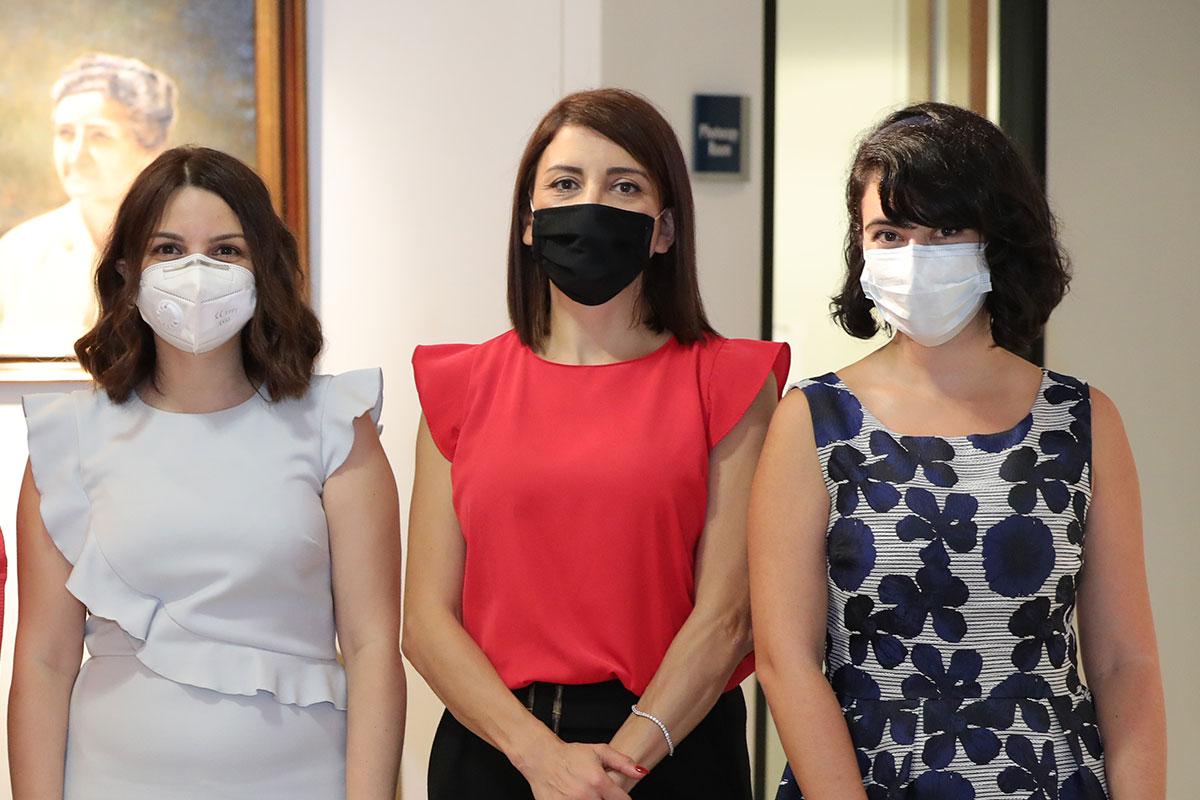
In the annual faculty meeting during which the Office of the Provost recognizes faculty members who have distinguished themselves in teaching innovation and research, the Teaching Excellence Award was granted to Associate Professor of Chemistry Jomana Elaridi (C) and the Research Excellence Award was awarded to Associate Professor of Psychology Maria-Jose Sanchez-Ruiz (R) and Associate Professor of Biochemistry Sama Sleiman (L).
COVID-19 Measures, Research and Initiatives
The development and availability of vaccines against COVID-19 was only the beginning of yet another challenge country-wide, that of reaching herd immunity in as short a time as possible. Determined to assist the Ministry of Public Health in its national vaccination campaign, and resume in-person learning in fall 2021, LAU rallied to expedite the immunization of its community and the community at large for a safe return to its campuses.
Measures
In response to the alarming spike in COVID-19 cases, LAU ramped up its fight against the disease on two fronts.
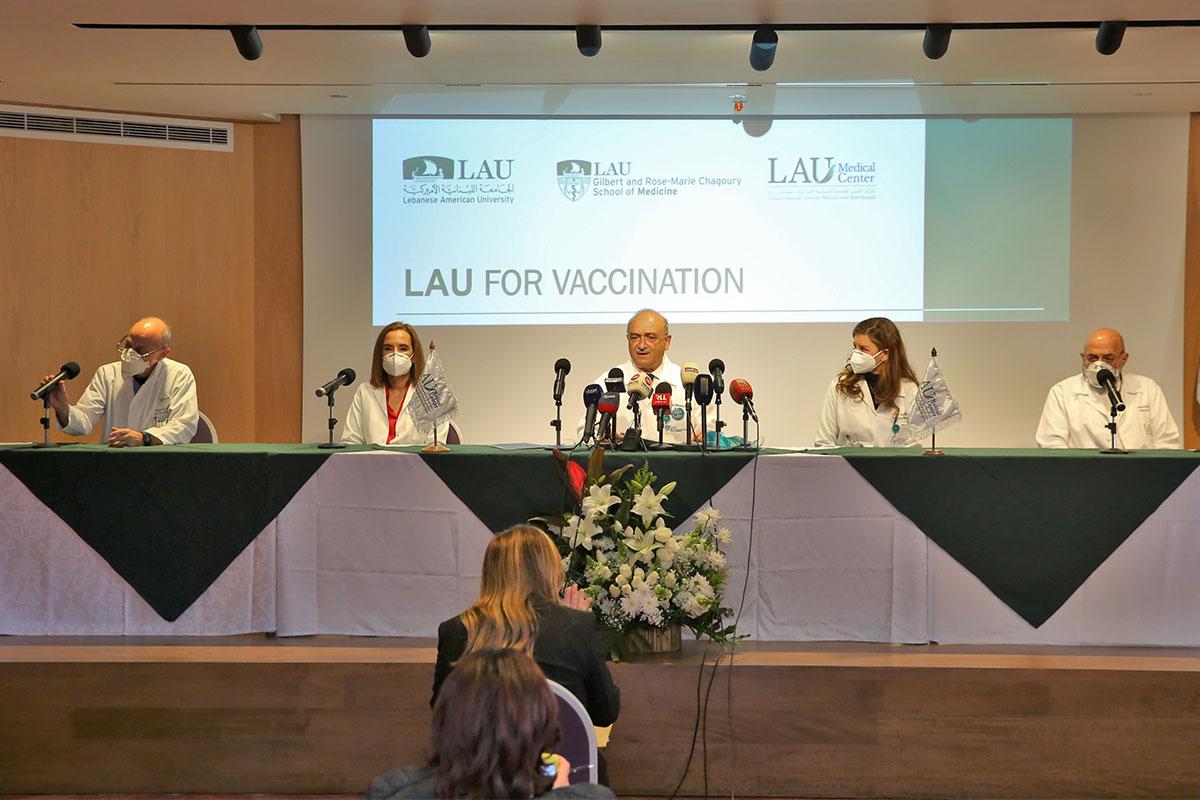
In February 2021, and in response to circulating falsehoods on the efficacy and safety of the COVID-19 vaccine, LAU held a press conference at the LAU Medical Center-Rizk Hospital to affirm its endorsement of the national vaccination campaign.
The Emergency Health Response Committee also launched an awareness campaign on the importance to wear a mask as a vital first line of protection, while the LAU Medical Center-Rizk Hospital - which had reached full capacity - set up additional temporary units to receive the overflow of infected patients, and prepared the COVID-19 Vaccination Village where it had started administering vaccines supplied by the Ministry of Public Health (MoPH).
Site preparation and readiness; cold chain requirements at both the medical center and the university; training of the medical team, paramedical staff, security and clerical support; internal and external communication; an IT database, set-up of a patient’s portals; and ongoing coordination with the MoPH were only a few of the logistical requirements involved.
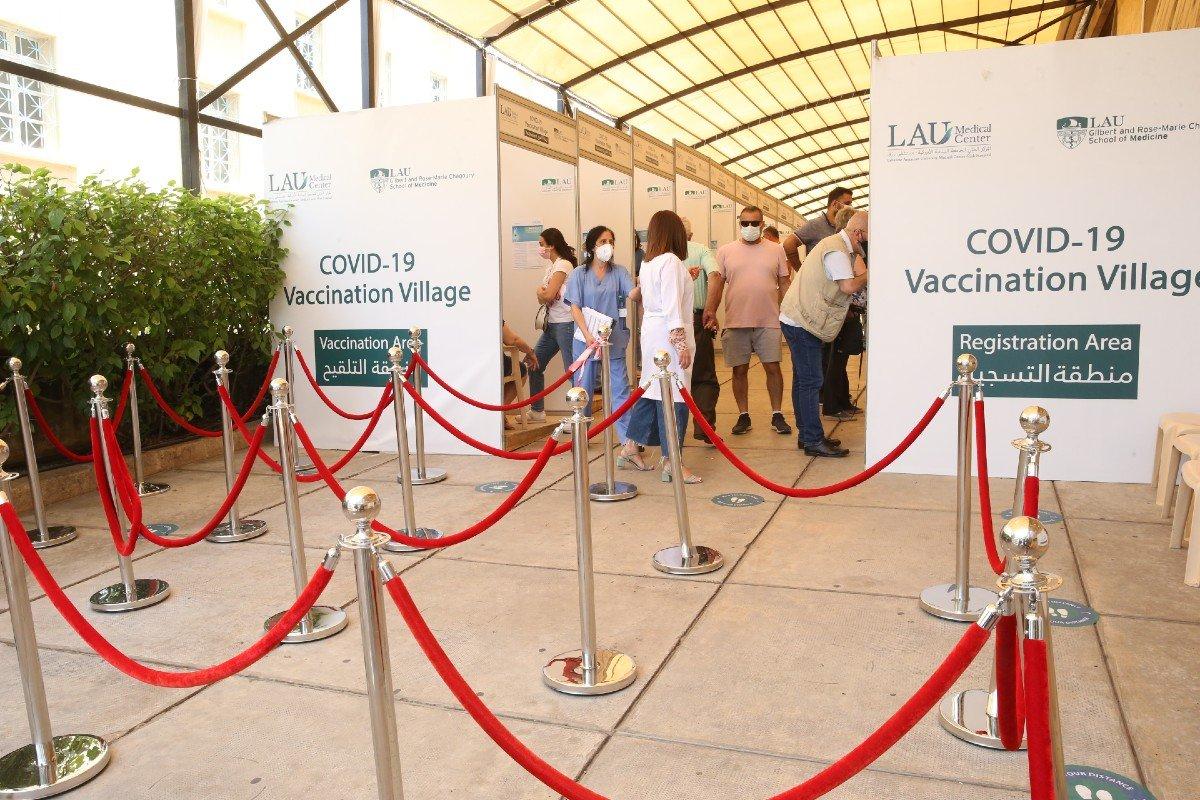
The vaccination village was erected at Entrance A of the hospital for natural ventilation. It includes a waiting area, a registration desk, 10 vaccination stations where every ‘patient’ is received by a registered nurse (RN), and an internal negative pressure resting area where every vaccinated person is required to spend 10-15 minutes before leaving the village.
Research
A study by a team of LAU faculty, students and postdocs titled “Derivatization and combination therapy of COVID-19 therapeutic agents” and published by Elsevier, has reviewed the top 10 promising drugs against SARS-CoV-2, proposing to change their structure into novel drugs that may display higher toxicity against the virus. The study was conducted by Dr. Robin Taleb, assistant dean at the School of Arts and Sciences (SoAS),
Dr. Mohammad Mroueh, chair of the Pharmaceutical Sciences Department in the School of Pharmacy, Dr. Elias Akoury, assistant professor of chemistry at SoAS, Dr. Sally El Kantar and Dr. Bilal Nehmeh, research faculty members at SoAS, and LAU chemistry students Philipe Saad, Gabie Mitri and Celine Estephan.
A team at LAU’s School of Pharmacy (SOP) in collaboration with Human Link successfully sequenced and analyzed the full-length genomes of four severe acute respiratory syndrome coronavirus 2 (SARS-CoV-2) strains isolated in Lebanon. This was one of three interconnecting and timely projects being spearheaded at LAU by Associate Professor of Pharmacy Jad Abdallah along with SOP research faculty and postdoctoral fellow Walid Abi Habib. For the two other projects, one investigates the seroprevalence (a survey that uses blood tests to estimate the percentage of people in a population who have antibodies against the virus) of the SARS-CoV-2 antibodies in the Lebanese population, and the other examines coronavirus infections in animals.
A review article by natural sciences graduate students Elie Abi Khalil, Mohammad Farran and Nada El Baba under the supervision of Associate Professor Mirvat El-Sibai and Head of Infectious Diseases Rola Husni-Samaha debunked the rhetoric against COVID-19 vaccines. Using scientific evidence and historical facts, the paper responds to false information that has been circulating among the general public.
Initiatives
Realizing the need to scale up the supply and delivery of vaccines, LAU launched a vaccination fundraising campaign in February 2021 toward procuring vaccines directly from manufacturers.
An agreement signed on April 16 between the ministry and a consortium of four university medical centers allowed the latter to procure and deploy the Pfizer-BioNTech vaccine, provided it was done under the government’s vaccination platform and included targeting underserved communities free of charge.
The LAU Vaccination & COVID-19 Response Campaign, a six-week crowdfunding initiative, was immediately launched to raise $150,000 as part of a broader $2.25 million campaign to secure vaccines for its students, faculty, and staff, as well as the greater community.
With the generous support of donors, the campaign secured a total of $62,000, 40 percent of its goal and a portion of the initial 80,000 Pfizer-BioNTech vaccines, enabling the university to start vaccinating its students, faculty, staff and alumni on June 11, 2021, at the LAU Medical Center-Rizk Hospital.
On the first day of the rollout, 200 vaccinations took place starting with priority groups - medical condition and age - based on an internal survey conducted by the university.
In fall 2021, with approximately 98 percent of its community vaccinated, LAU opened its campuses to the students under strict COVID-19 precautionary measures.
Learning
For the second consecutive year, LAU launched the Graduate Program Scholarships (GPS) in 2021 for research-oriented applicants committed to conduct and publish research projects, in line with the university’s goal of enhancing the build-up of intellectual capital. This initiative was taken at the Graduate Studies and Research (GSR) in challenging times where the need to remain competitive in research is ever pressing.
In April 2021, the School of Arts and Sciences (SoAS) launched a call for applications for the second edition of its Undergraduate Research and Discovery Program (URaD) to all SoAS students. The one-year program for SoAS junior students from all majors allows them to conduct research and/or artistic projects under the direct supervision of a faculty mentor, without the pressure of failing their courses.
Together with the United States Agency for International Development (USAID), LAU hosted a virtual ceremony end of May 2021 to celebrate the graduation of 66 University Scholarship Program (USP) scholars who have earned their undergraduate degrees with the full support of USAID.
In June 2021, the Gilbert and Rose-Marie School of Medicine honored its ninth graduating class, sixth group of residents, and second cohort of graduating fellows in a hybrid ceremony that was livestreamed from Byblos campus. Also in June, marking the rite of passage of 61 medical students from the preclinical years to clinical wards, the school hosted the White Coat Ceremony in the LAU Medical Center-Rizk Hospital outdoor garden on June 7.
As with many fashion schools around the world a live graduate runway show could not be held due to prevailing health restrictions, LAU’s School of Architecture and Design opted for a fashion film, Rise, to spotlight the work of the Bachelor of Fine Arts in Fashion Design’s fifth cohort.
Overseen by Program Director Silia Abou Arbid and directed by Missak HajiAvedikian, Rise showcased the graduates’ collections, while doubling as a springboard for the 11 graduates into the world of fashion through striking online presence.
In August 2021, 28 PharmD and four postgraduate year 1 (PGY1) pharmacy resident graduates - cohorts 1 and 2 - from the Pharmacy celebrated the beginning of their professional journey during a hooding and graduation ceremony on the LAU Byblos campus, which was also livestreamed. In November 2021, following a one-year hiatus because of the pandemic, the School of Pharmacy also held its White Coat Ceremony to celebrate two classes of 129 future pharmacists: Professional Year 1 (P1) and Professional Year 2 (P2) students. These two cohorts had already started their professional degree program incorporating didactic and lab courses, experiential education, interprofessional education and practice, and co-curricular activities.
As part of the larger strategic plan to extend the university’s footprint beyond Lebanon and the region and export its programs and expertise, LAU announced in August that it would be launching two online master’s degree programs, the MBA in Global Business Administration in fall 2021 and the Master of Science in Computer Science in January 2022.
LAU’s Office of Graduate Studies and Research (GSR) held its first Student Research Awards ceremony, online, in recognition of undergrad and graduate students who have had an impressive research track during their years of study. The awardees, all of whom had published papers, were Vicky Panossian, (Arts and Humanities), Achraf Jardaly (Life sciences and Medicine), Issam Abdo Ahmad (Social Sciences and Management), and Christelle Sawaya (Engineering and Technology).
In September 2021, two LAU students determined to disrupt the status quo brought back the LAU Case Competition, a student-led initiative that creates a win-win haven for both job-seeking undergraduates and leading businesses. Over the course of five months, banking and finance graduate Lara Baz (BS ‘21) and industrial engineering senior Despina Bachour recruited 580 undergraduate students from 17 universities across Lebanon to take part in the competition, while partnering with five leading multinational companies: Ernst & Young (EY), Leo Burnett, Unilever, Cisco and Merck Sharp & Dohme (MSD).
Partnerships
During a visit with President Michel E. Mawad and Dean Elie Haddad in December 2020, Mr. Elie Saab expressed his continued support for the LAU Fashion Design program. Several initiatives were also discussed to preserve the program’s leading position in design education in Lebanon and the region. A follow-up meeting was held by Interim Director of the program Celia Abou Arbid with Elie Saab Jr. and team. In April 2021, Mr. Saab was at LAU to oversee the 2021 graduating class’s collection.
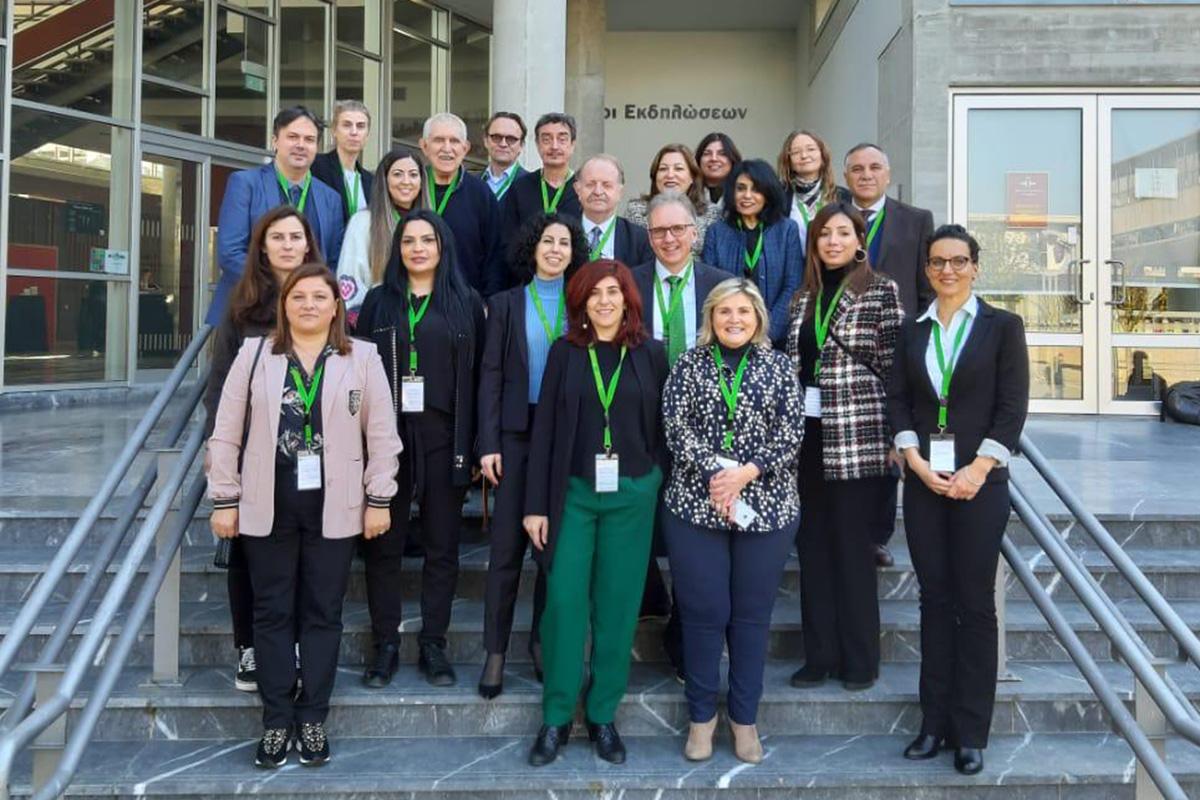
LAU became a main partner in a nationwide project, LEBPASS, that aims to enhance students’ mobility by making their academic qualifications clearly and easily understood nationally and internationally, and in the process promote the higher education system in Lebanon. The featured photo was taken when the LEBPASS partners gathered for a workshop hosted by the University of Cyprus in January 2020.
The project, co-funded by the Erasmus+ Programme of the European Union, involves a consortium of universities charged with creating a LEBPASS platform and implementing a standardized diploma supplement - a comprehensive description of the nature, level, content and status of studies completed by the student. This will ensure alignment between institutions of higher learning in Lebanon and academic recognition and transparency, among others.
LAU Consult, the Adnan Kassar School of Business (AKSOB), and Continuing Education (LAU CE) partnered with Sanofi, a global pharmaceutical company, on the Sanofi Development Program (SDP). The program is a first for Sanofi in the Levant and offers the company’s sales and medical representatives, and field, marketing, and key account managers in the Levant (Lebanon, Jordan, Iraq, and Palestine) custom-made three-year training per business unit and per market.
In October 2020, Contracting and Trading (CAT) international established at LAU the CAT International Scholarship Grant, which is earmarked to support LAU distinguished, needy and deserving students, studying at LAU School of Engineering.
In November 2020, the School of Engineering established the Industry-focused Lebanese Education & Academia Partnership (iLEAP) with LebNET, a non-profit organization comprising a network of technology experts and professionals of Lebanese descent in North America. Through iLEAP, highly qualified LebNET members offered lectures remotely or in-person in support of LAU professors’ credited classes. The topics covered are entirely industry-focused to keep students up to date with current and emerging technology trends in their profession.
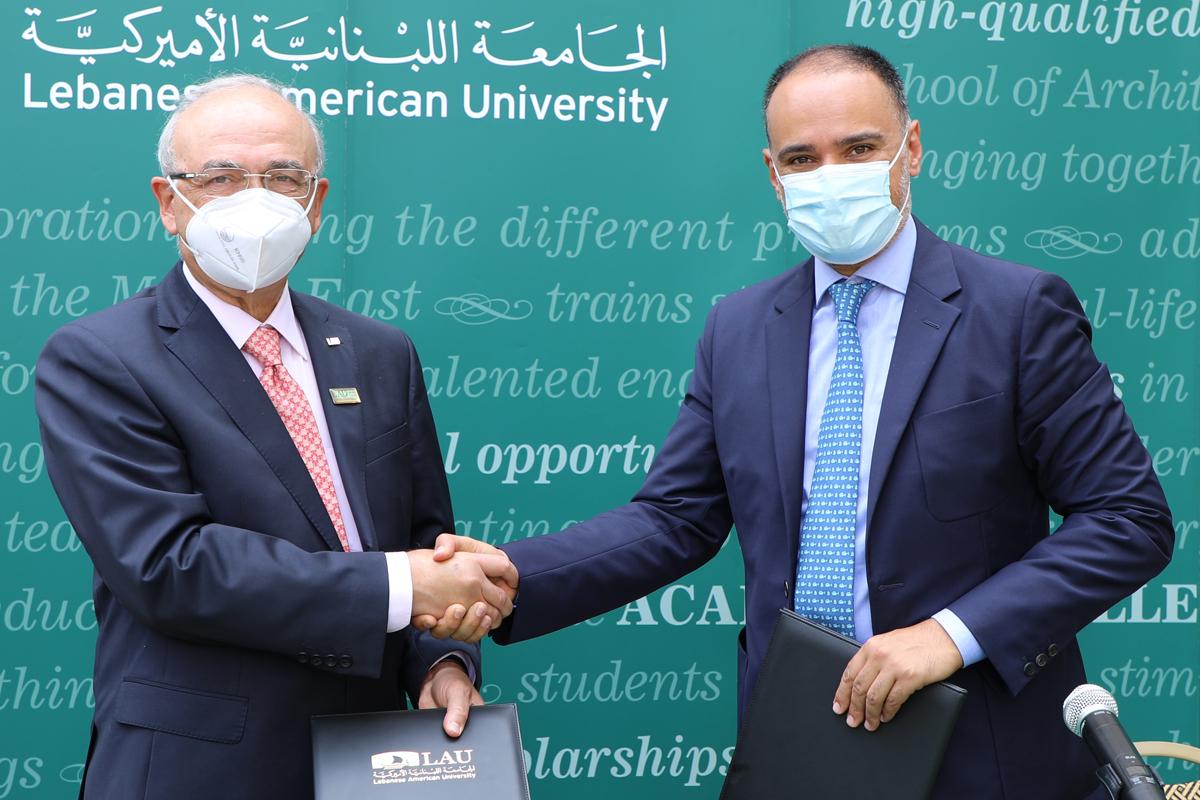
In May 2021, following a series of similar partnership agreements with the Lebanese public sector, LAU has signed a Protocol of Cooperation with the Investment Development Authority of Lebanon (IDAL), in an effort to fortify strategic partnerships, especially those aimed in pursuit of shared goals. The agreement will provide prospects for both institutions, including bolstering employability for LAU students, and access to quality education, professional development, and consultancy for investors.
Also in May, and thanks to a MEPI grant to adapt and apply the Vertically Integrated Projects (VIP) at LAU, the university was able to join the VIP Consortium, which includes 45 universities from around the world. Originally conceived by The Georgia Institute of Technology (Georgia Tech), the program allows teams of students from across academic years and disciplines to develop innovative projects.